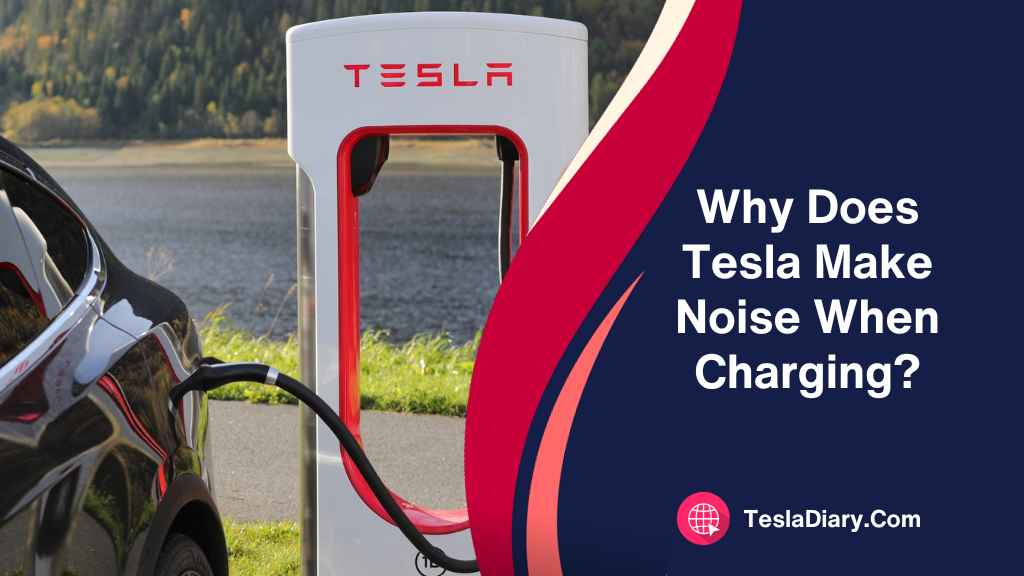Tesla electric vehicles (EVs) are known for their quiet and smooth operation.
However, it’s not uncommon for Tesla owners to notice various sounds emanating from their cars during the charging process. These noises can range from normal operational sounds to potentially concerning ones.
In this article, we’ll explore the reasons why your Tesla might make noise when charging, helping you better understand what’s happening with your electric vehicle.

1. Cooling Fans
Tesla vehicles are equipped with sophisticated thermal management systems to maintain the optimal temperature of their battery packs. Central to this system are cooling fans.
These fans become more active when the battery is being charged at a high rate or when the ambient temperature is elevated. The sound produced by these fans is typically a low humming or whirring noise.
This noise is perfectly normal and indicates that your Tesla is effectively managing its battery temperature to ensure safe and efficient charging.
The cooling fans play a crucial role in preventing the battery from overheating, which can have adverse effects on its lifespan and performance. So, if you hear these fans working, it’s a sign that your Tesla is actively maintaining the ideal operating conditions for your battery.
2. Relays and Contactors
Electric vehicles rely on an intricate network of relays and contactors to control the flow of electricity. These components act as switches, opening and closing circuits to manage the power distribution within the vehicle.
During charging and discharging cycles, you might hear clicking or clunking sounds as these relays and contactors engage and disengage. These sounds are perfectly normal and are an inherent part of the electrical system’s operation.
The clicking sounds you hear are akin to the sounds of switches turning on and off. They indicate that the various electrical components in your Tesla are functioning correctly and that the electrical power is being managed efficiently.
3. Charging Cable
The charging cable and connector are another potential source of noise during the charging process. If the cable isn’t securely connected to the charging port, you may hear a clicking or buzzing sound as the car attempts to establish a stable connection.
Ensuring a proper and secure connection is essential not only to prevent these noises but also to ensure a safe and efficient charging process.
Sometimes, the connector’s alignment with the charging port can cause these sounds. Ensuring that the connector is properly aligned and inserted will typically resolve this issue.
4. Transformer Hum
Charging equipment often contains transformers, which are essential components for converting the electrical current from the charging station into a form that can be used by your Tesla’s battery.
These transformers can produce a low-frequency hum during their operation. The humming sound is typically not loud and is considered part of the normal operation of the charging system.
The transformers in your charging equipment are designed to efficiently convert electricity while minimizing energy loss. The low hum you might hear is a testament to their effective function.
5. Coolant Pumps
Certain Tesla models utilize coolant pumps to manage the battery’s temperature during charging. These pumps may produce a mild humming sound as they circulate coolant through the battery pack. This noise is usually very quiet and not disruptive.
The purpose of these pumps is to maintain the battery at the ideal operating temperature, ensuring that it charges efficiently and prolonging the life of the battery. If you do hear this sound, it’s a sign that your Tesla’s thermal management system is actively working to keep the battery in optimal condition.
6. Electrical Noise
In some cases, the charging equipment may generate electromagnetic interference (EMI) or electrical noise, resulting in a buzzing or humming sound. This noise can be noticeable, but it’s generally not a cause for concern unless it’s accompanied by other issues like charging problems or error messages.
Electrical noise can result from various factors, such as the quality of the charging equipment, the electrical supply at your location, or the specific configuration of your Tesla’s charging system. While it might be bothersome, it typically does not indicate a serious problem.
7. Metal Expansion and Contraction
During the charging and discharging cycles of an EV’s battery, the metal components within the battery pack can expand and contract.
These adjustments can occur due to temperature changes or the flow of electrical current. While not always audible, in some instances, especially when temperature fluctuations are significant or the battery is under a heavy load, you might hear creaking or popping sounds as the metal components adapt to these changes.
Metal expansion and contraction are inherent to the physical properties of materials and are not usually problematic.
However, it’s important to note that these sounds should not be excessively loud or accompanied by other concerning symptoms. If you notice unusually loud or persistent noises, it’s advisable to have your Tesla inspected by a certified service technician to ensure there are no underlying issues with the battery or its thermal management system.
Conclusion
While Tesla electric vehicles are generally known for their quiet operation, it’s normal to hear various noises when the car is charging. Most of these sounds are part of the EV’s regular operation and are nothing to be concerned about.
In fact, many of these noises are indicative of your Tesla’s sophisticated systems actively working to maintain optimal performance and safety.
However, if you ever encounter unusual or excessively loud noises, especially if they are accompanied by charging issues or error messages, it’s advisable to seek professional assistance from Tesla’s customer support or a certified service center to ensure the health and safety of your electric vehicle.
Understanding the different types of noises that can occur during charging will help you distinguish between normal operational sounds and potential problems. In most cases, your Tesla’s charging noises are a reassuring sign that your electric vehicle is operating as designed, efficiently and safely charging its battery for your next adventure on the road.
Additional resources

